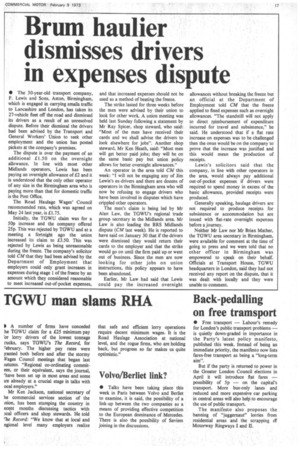Brum haulier dismisses drivers in expenses dispute
Page 19

If you've noticed an error in this article please click here to report it so we can fix it.
• The 30-year-old transport company, F. Lewis and Sons, Aston, Birmingham, which is engaged in carrying smalls traffic to Lancashire and London, has taken its 27-vehicle fleet off the road and dismissed its drivers as a result of an unresolved dispute. Before their dismissal the drivers had been advised by the Transport and General Workers' Union to seek other employment and the union has posted pickets at the company's premises.
The dispute is over the payment of an additional £1.50 on the overnight allowance. In line with most other Midlands operators, Lewis has been paying an overnight allowance of £2 and it is understood that the only other operator of any size in the Birmingham area who is paying more than that for domestic traffic is the Post Office.
The Road Haulage Wages' Council recommended rate, which was agreed on May 24 last year, is £1.75.
Initially, the TGWU claim was for a 50p increase and the company offered 25p. This was rejected by TGWU and at a meeting a fortnight ago the union increased its claim to £3.50. This was rejected by Lewis as being unreasonable during the freeze. The company's solicitor told CM that they had been advised by the Department of Employment that employers could only grant increases in expenses during stage 1 of the freeze by an amount which they considered reasonable to meet increased out-of-pocket expenses,
and that increased expenses should not be used as a method of beating the freeze.
The strike lasted for three weeks before the men were advised by their union to look for other work. A union meeting was held last Sunday following a statement by Mr Ray Spicer, shop steward, who said: "Most of the men have received their cards and we shall advise the drivers to look elsewhere for jobs". Another shop steward, Mr Ken Heath, said: "Most men will get better paid jobs; they will be on the same basic pay but union policy allows for better overnight allowances."
An operator in the area told CM this week: "I will not be engaging any of Jim Lewis's ex-drivers and there are dozens of operators in the Birmingham area who will now be refusing to engage drivers who have been involved in disputes which have crippled other operators.
The men's claim is being led by Mr Alan Law, the TGWU's regional trade group secretary in the Midlands area. Mr Law is also leading the BRS Midlands dispute (CM last week). He is reported to have said on January 30 that if the drivers were dismissed they would return their cards to the employer and that the strike would go on until the firm paid up or went out of business. Since the men are now looking for other jobs on union instructions, this policy appears to have been abandoned.
Earlier, Mr Law had said that Lewis could pay the increased overnight
allowances without breaking the freeze but an official at the Department of Employment told CM that the freeze applied to fixed expenses such as overnight allowances. "The standstill will not apply to direct reimbursement of expenditure incurred for travel and subsistence," he said. He understood that if a flat rate increase on expenses was to be challenged then the onus would be on the company to prove that the increase was justified and this would mean the production of receipts.
Lewis's solicitors said that the company, in line with other operators in the area, would always pay additional out-of-pocket expenses if drivers were required to spend money in excess of the basic allowance, provided receipts were produced.
Generally speaking, haulage drivers are not required to produce receipts for subsistence or accommodation but are issued with flat-rate overnight expenses before a journey.
Neither Mr Law nor Mr Brian Mather, the TGWU area secretary in Birmingham, were available for comment at the time of going to press and we were told that no other officer in Birmingham was empowered to speak on their behalf. Officials at Transport House, TGWU headquarters in London, said they had not received any report on the dispute, that it was dealt with locally and they were unable to comment.
































































































